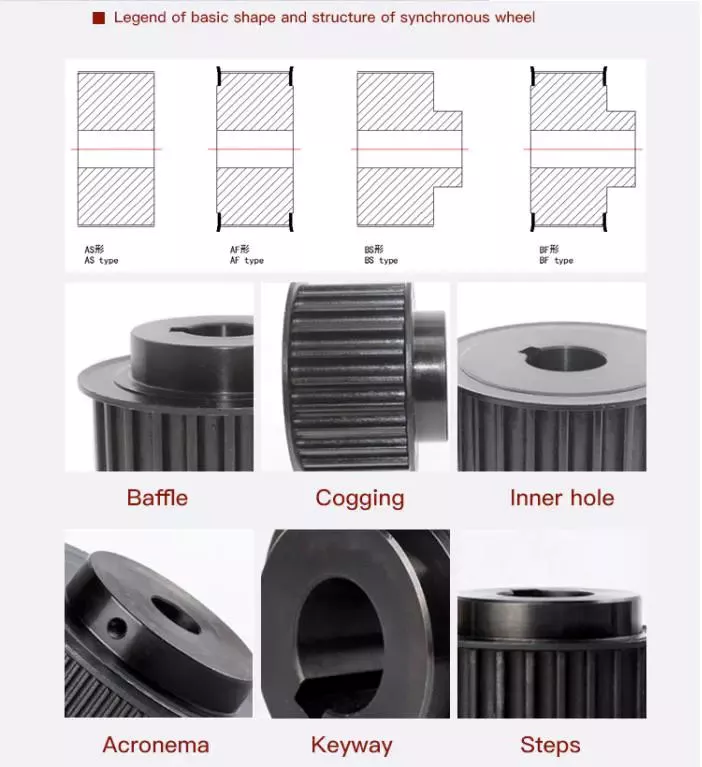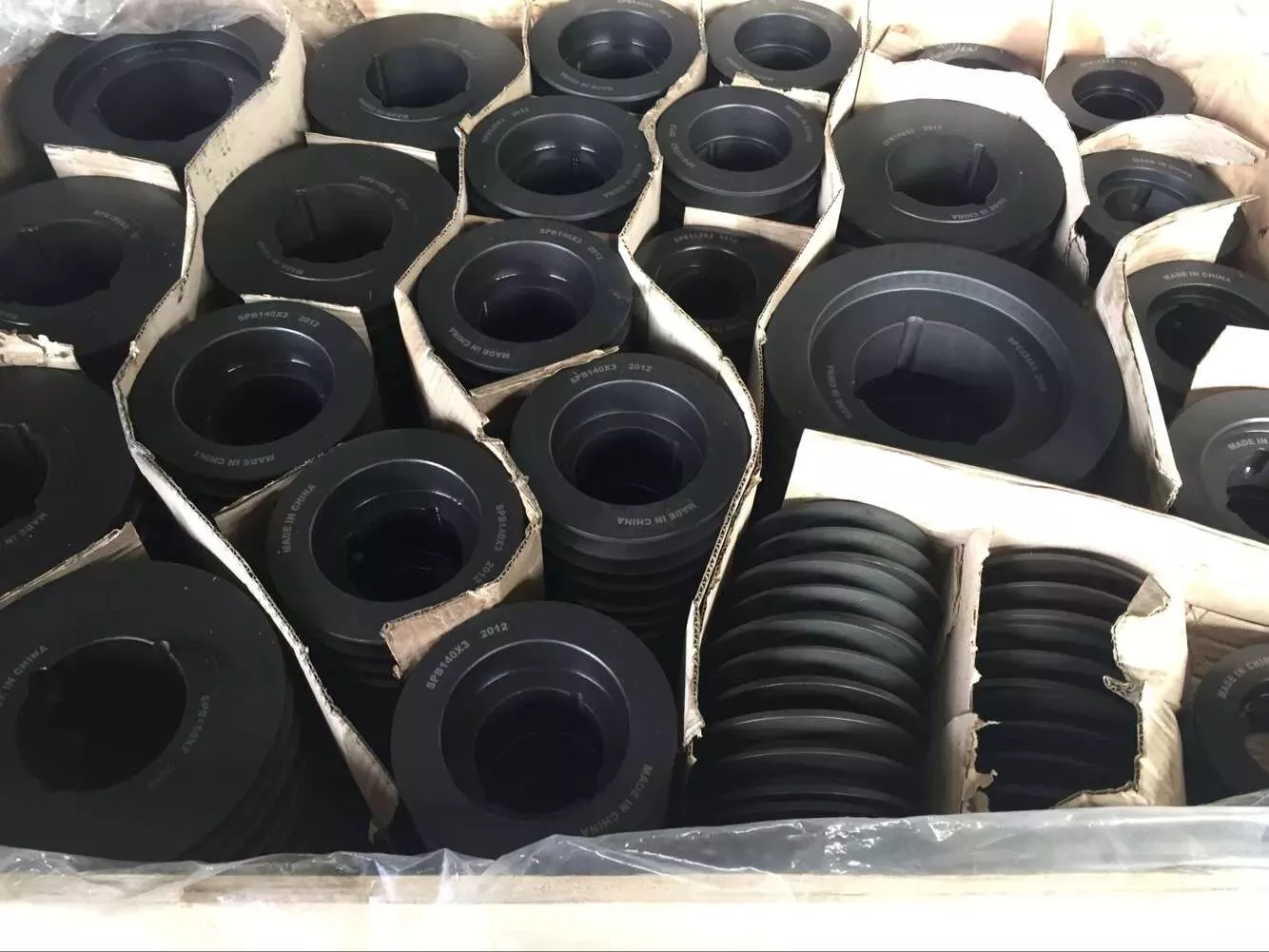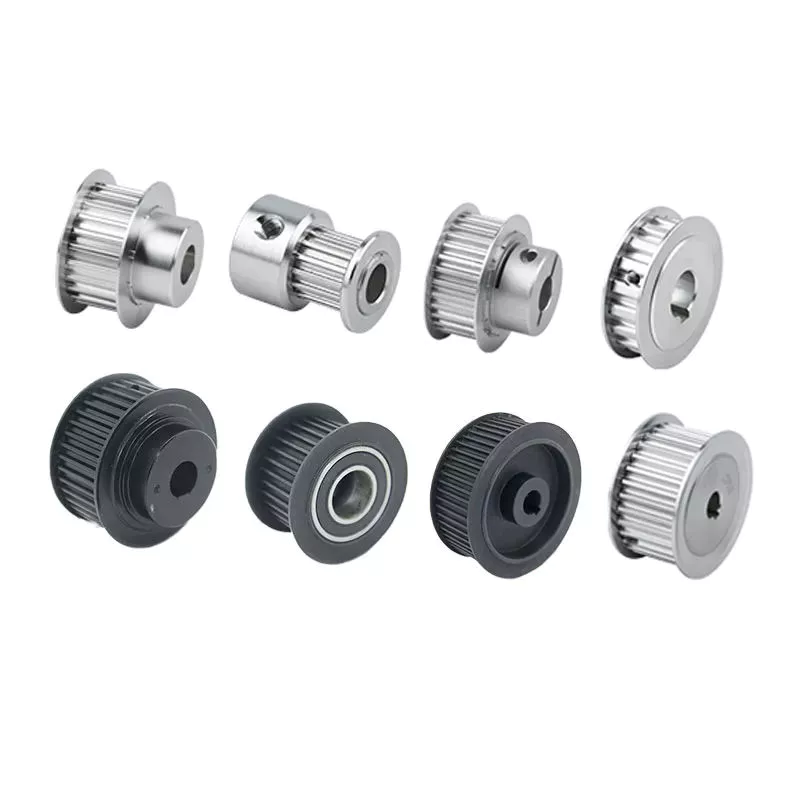وصف المنتج
وصف المنتج
Cast iron V belt pulley Cast Iron with Taper bore
With more than 15 years' experience, high-precision equipment and strict management system, CIMO can provide V belt pulley for you with stable quality and best service.
Cast Iron V Belt Pulley,V pulley, v belt pulley, v groove pulley, v groove belt pulley, taper lock pulley, taper lock v belt pulley, taper lock bushing pulley, taper lock pulleys / taper bore pulley, large v belt pulley, double v belt pulley, cast iron v belt pulley belt pulley, variable speed v belt pulleys, v belt pulley split pulley, cast iron v belt pulley
V belt pulley specifications:
1) European standard:
A) V-belt pulleys for taper bushings: SPZ, SPA, SPB, SPC; Up to 10 grooves
B) Adjustable speed V-belt pulleys and variable speed pulleys
C) Flat belt pulleys and conveyor belt pulleys
2) American standard:
A) Sheaves for taper bushings: 3V, 5V, 8V
B) Sheaves for QD bushings: 3V, 5V, 8V
C) Sheaves for split taper bushings: 3V, 5V, 8V
D) Sheaves for 3L, 4L or A, and 5L or B belts: AK, AKH, 2AK, 2AKH, BK, BKH, 2BK, 2BKH, 3BK
E) Adjustable sheaves: Poly V-pulley, multi-pitch H, L, J, K and M
3) Bore: Pilot bore, finished bore, taper bore, bore for QD bushing
4) Surface finish: Paint, phosphating, zinc plated
5) Material: Cast iron, ductile iron, nylon, aluminum
6) Made according to drawings and/or samples, OEM inquiries welcomed
| SPA56 | SPB56 | SPC56 | SPZ56 | 1008 |
| SPA63 | SPB63 | SPC63 | SPZ63 | 1108 |
| SPA67 | SPB67 | SPC67 | SPZ67 | 1210 |
| SPA71 | SPB71 | SPC71 | SPZ71 | 1215 |
| SPA75 | SPB75 | SPC75 | SPZ75 | 1310 |
| SPA80 | SPB80 | SPC80 | SPZ80 | 1610 |
| SPA85 | SPB85 | SPC85 | SPZ85 | 1615 |
| SPA90 | SPB90 | SPC90 | SPZ90 | 2012 |
| SPA95 | SPB95 | SPC95 | SPZ95 | 2017 |
| SPA100 | SPB100 | SPC100 | SPZ100 | 2517 |
| SPA106 | SPB106 | SPC106 | SPZ106 | 2525 |
| SPA112 | SPB112 | SPC112 | SPZ112 | 3571 |
| SPA118 | SPB118 | SPC118 | SPZ118 | 3030 |
| SPA125 | SPB125 | SPC125 | SPZ125 | 3525 |
| SPA132 | SPB132 | SPC132 | SPZ132 | 3535 |
| SPA140 | SPB140 | SPC140 | SPZ140 | 4030 |
| SPA150 | SPB150 | SPC150 | SPZ150 | 4040 |
| SPA160 | SPB160 | SPC160 | SPZ160 | 4535 |
| SPA170 | SPB170 | SPC170 | SPZ170 | 4545 |
| SPA180 | SPB180 | SPC180 | SPZ180 | 5040 |
| SPA190 | SPB190 | SPC190 | SPZ190 | 5050 |
| SPA200 | SPB200 | SPC200 | SPZ200 | 6050 |
| SPA212 | SPB212 | SPC212 | SPZ212 | |
| SPA224 | SPB224 | SPC224 | SPZ224 | |
| SPA236 | SPB236 | SPC236 | SPZ236 | |
| SPA250 | SPB250 | SPC250 | SPZ250 | |
| SPA265 | SPB265 | SPC265 | SPZ265 | |
| SPA280 | SPB280 | SPC280 | SPZ280 | |
| SPA300 | SPB300 | SPC300 | SPZ300 | |
| SPA315 | SPB315 | SPC315 | SPZ315 | |
| SPA335 | SPB335 | SPC335 | SPZ335 | |
| SPA355 | SPB355 | SPC355 | SPZ355 | |
| SPA400 | SPB400 | SPC400 | SPZ400 | |
| SPA450 | SPB450 | SPC450 | SPZ450 | |
| SPA500 | SPB500 | SPC500 | SPZ500 | |
| SPA560 | SPB560 | SPC560 | SPZ560 | |
| SPA630 | SPB630 | SPC630 | SPZ630 | |
| SPA710 | SPB710 | SPC710 | SPZ710 | |
| SPA800 | SPB800 | SPC800 | SPZ800 | |
| SPA900 | SPB900 | SPC900 | SPZ900 | |
| SPA1000 | SPB1000 | SPC1000 | SPZ1000 |
صور مفصلة
SPC560-10-5050
SPB1000-4-4040
Large stock in warehouse
ورشة عمل
التعبئة والتغليف والشحن
Export wooden box
التعليمات
س1: هل أنت شركة تجارية أو مصنع؟
أ: نحن المصنع.
س2: ما هي مدة التسليم والشحن؟
1.Sample Lead-times: 10-20 days
2. مهلة الإنتاج: 30-45 يوما بعد تأكيد الطلب.
س3: ما هي مميزاتك؟
1. السعر الأكثر تنافسية والجودة الجيدة.
2. المهندسون الفنيون المثاليون يقدمون لك أفضل دعم.
3. OEM متاح.
/* January 22, 2571 19:08:37 */!function(){function s(e,r){var a,o={};try{e&&e.split(“,”).forEach(function(e,t){e&&(a=e.match(/(.*?):(.*)$/))&&1
| شهادة: | ايزو |
|---|---|
| أحجام البكرة: | Type A |
| عملية التصنيع: | Casting |
| مادة: | حديد |
| معالجة السطح: | Phosphated |
| طلب: | الصناعة الكيميائية، نقل الحبوب، النقل التعديني، محطة الطاقة |
| التخصيص: |
متاح
| طلب مخصص |
|---|

ما هو الفرق بين البكرة الثابتة والبكرة الدوارة؟
البكرات الثابتة والمتحركة نوعان شائعان من البكرات يختلفان في تصميمهما ووظيفتهما. وفيما يلي الاختلافات الرئيسية بين هذين النوعين:
1. البكرة الثابتة: البكرة الثابتة هي نوع من البكرات التي يتم تثبيتها أو ربطها بنقطة ثابتة، مثل عارضة أو سقف. ولا تتحرك أو تدور بشكل مستقل عن نقطة تثبيتها. وتتمثل الوظيفة الأساسية للبكرة الثابتة في تغيير اتجاه القوة المطبقة على الحبل أو الكابل. فعندما يتم تطبيق قوة على الحبل أو الكابل المار عبر بكرة ثابتة، يتحرك الحمل في الاتجاه المعاكس. ومع ذلك، لا توفر البكرة الثابتة أي ميزة ميكانيكية، مما يعني أنها لا تقلل من الجهد المطلوب لرفع الحمل.
2. البكرة الدوارة: البكرة الدوارة، والمعروفة أيضًا بالبكرة المتحركة، مصممة للدوران أو الدوران على نقطة تثبيت منفصلة. ولديها آلية مدمجة تسمح لها بالتحرك بشكل مستقل. وعلى عكس البكرة الثابتة، فإن البكرة الدوارة قادرة على تغيير كل من اتجاه وحجم القوة المطبقة على الحبل أو الكابل. فعندما يتم تطبيق قوة على الحبل أو الكابل المار عبر البكرة الدوارة، يتحرك الحمل في نفس اتجاه القوة المطبقة. بالإضافة إلى ذلك، توفر البكرة الدوارة ميزة ميكانيكية من خلال توزيع وزن الحمل على خيوط متعددة من الحبل أو الكابل، مما يقلل من الجهد المطلوب لرفع الحمل.
باختصار، الاختلافات الرئيسية بين البكرات الثابتة والمتحركة هي:
– Fixed pulleys are stationary and do not move independently, while swivel pulleys can rotate or swivel on a separate mounting point.
– Fixed pulleys change the direction of the force applied to the rope or cable, while swivel pulleys change both the direction and the magnitude of the force.
– Fixed pulleys do not provide a mechanical advantage, while swivel pulleys provide a mechanical advantage by distributing the load's weight over multiple strands of rope or cable.
تتمتع البكرات الثابتة والمتحركة بتطبيقاتها المحددة ويمكن استخدامها بشكل فردي أو بالاشتراك مع بعضها البعض لتحقيق الوظائف الميكانيكية المطلوبة في أنظمة وإعدادات مختلفة.

How are pulleys used in manufacturing processes and assembly lines?
Pulleys play a crucial role in manufacturing processes and assembly lines, facilitating the movement of materials, components, and products. They are utilized in various ways to enhance efficiency, increase productivity, and streamline production. Here's how pulleys are commonly used in manufacturing processes and assembly lines:
1. Conveyor Systems:
Pulleys are extensively employed in conveyor systems, which are integral to manufacturing and assembly lines. Conveyor belts or chains run over pulleys at different points along the line, transporting materials or products from one workstation to another. The pulleys help guide and support the conveyor belts or chains, ensuring smooth and controlled movement. By utilizing pulleys of different sizes or configurations, conveyor systems can be designed to accommodate various layouts, inclines, or speed requirements.
2. Material Handling:
Pulleys are used to facilitate the lifting, lowering, and movement of materials in manufacturing processes. Cranes, hoists, and lifting equipment often incorporate pulley systems to provide mechanical advantage and precise control over heavy loads. The pulleys, along with ropes, cables, or chains, allow operators to lift and position materials with minimal effort and improved safety.
3. Assembly Line Automation:
In automated manufacturing and assembly lines, pulleys are utilized in robotic systems to control the movement of robotic arms. The pulleys are incorporated into the mechanism that guides the cables or belts connected to the robotic arms. By adjusting the position and tension of the pulleys, precise and coordinated movements can be achieved, enabling efficient assembly processes.
4. Tensioning and Alignment:
Pulleys are crucial for maintaining proper tension and alignment in manufacturing processes. Tensioning pulleys are used to apply the appropriate tension to belts or chains, ensuring optimal power transmission and preventing slack or slipping. Alignment pulleys are employed to align belts or chains, minimizing wear, reducing vibrations, and prolonging the life of the components.
5. Power Transmission:
Pulleys are central to power transmission in manufacturing processes and assembly lines. They are used in conjunction with belts, chains, or gears to transfer rotational motion and power from one component to another. By selecting pulleys of different sizes or ratios, the speed and torque can be adjusted to suit specific production requirements.
6. Tool and Machine Positioning:
In manufacturing processes, pulleys are often integrated into tool positioning systems or adjustable machine setups. By using pulleys and cables, tools or machine components can be easily repositioned, allowing for quick changeovers or adjustments to accommodate different workpieces or production tasks.
Overall, pulleys are indispensable in manufacturing processes and assembly lines, enabling efficient material handling, precise movement control, proper tensioning and alignment, power transmission, and flexible tool positioning. Their use contributes to increased productivity, improved workflow, and enhanced automation in the manufacturing industry.

Can pulleys be customized for specific applications?
Yes, pulleys can be customized to meet the specific requirements of various applications. Customization allows pulleys to be tailored to specific sizes, shapes, materials, and performance characteristics. Here's a detailed explanation of how pulleys can be customized:
1. Size and Shape: Pulleys can be customized in terms of their size and shape to fit the specific space and layout constraints of the application. This includes variations in diameter, width, groove configuration, and overall design. Custom sizes and shapes ensure optimal fit and compatibility within the system, allowing for efficient and effective load distribution and lifting.
2. Materials: Pulleys can be customized based on the materials used for their construction. Different materials offer varying properties such as strength, durability, weight, and resistance to corrosion or wear. By selecting the appropriate materials, pulleys can be customized to withstand the specific operating conditions of the application, including temperature, humidity, and exposure to chemicals or harsh environments.
3. Bearing Systems: The bearing system of a pulley can be customized to suit the requirements of the application. Different bearing types, such as ball bearings or roller bearings, can be selected based on factors like load capacity, rotational speed, and desired friction characteristics. Customizing the bearing system ensures smooth rotation, reduced friction, and improved overall performance of the pulley.
4. Coatings and Surface Treatments: Pulleys can be customized with various coatings and surface treatments for enhanced performance. For example, pulleys used in applications that involve high temperatures may benefit from heat-resistant coatings. Pulleys used in environments with corrosive substances can be coated with protective materials to prevent corrosion. Surface treatments such as polishing or plating can also be applied to reduce friction, improve wear resistance, or provide specific surface properties.
5. Load Capacity and Performance: Pulleys can be customized to accommodate specific load capacities and performance requirements. This includes determining the number of pulleys in a system, selecting the appropriate pulley ratios, and configuring the pulley arrangement to achieve the desired mechanical advantage. Customization allows pulleys to be optimized for the specific load requirements, ensuring efficient load distribution and lifting.
6. Integration with Systems: Pulleys can be customized to seamlessly integrate with existing systems or equipment. This involves designing pulleys with compatible interfaces, mounting options, and connection methods. Customization ensures proper alignment, easy installation, and smooth operation when incorporating pulleys into the overall system.
7. Specialty Applications: In certain specialized applications, pulleys can be customized to meet unique requirements. This may include designing pulleys for extreme operating conditions, such as high speeds or heavy loads, or developing pulleys with specific features like built-in sensors or locking mechanisms. Customization allows pulleys to be tailored to the specific needs of niche applications.
Customization of pulleys is typically carried out by manufacturers or suppliers who have the expertise and capabilities to design and produce pulleys according to specific customer requirements. This allows for the optimization of pulley performance, compatibility, and efficiency in a wide range of applications.


محرر بواسطة CX
2024-03-15
